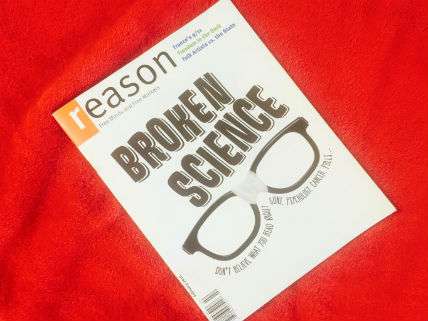Biomedical Study Reproducibility Scandalously Bad, Evidence for "Free Will," and Robot Rebellion by 2055
A scitech research and policy round up for January 5, 2016

Broken Science is the main focus of the February 2016 issue of Reason (if you are a subscriber, you should already have it). I highly recommend my colleague Brian Doherty's brilliant article, "You Know Less Than You Think About Guns."
I have an article that details the reproducibility crisis in science. Back in 2005 John Ioannidis, the head of Stanford University's Meta-Research Innovation Center (METRICS) famously declared that "most published research findings are false." In my Reason article, Ioannidis says, "In several fields, it is likely that most published research is still false."
Ioannidis and his colleagues have just published an article in PLOS Biology that checked a random sample of 441 biomedical journal articles published between 2000 and 2014 to see if they make all of their raw data and full research protocols available. Such transparency would make it possible for other researchers to seek to replicate the reported findings. They report, "Only one study provided a full protocol and none made all raw data directly available."
A companion study that asks, "Where have all the rodents gone?," notes, "An essential element of the reporting of any preclinical study is the number of samples." The researchers astonishingly report that most studies on preclinical cancer and stroke do not adequately report experimental animal attrition. As a result they conclude that preclinical studies are reporting greater positive effects than is actually the case. To correct this problem, they call for greater transparency and recommend that researchers prespecify inclusion and exclusion criteria for experimental animals and provide a flowchart showing how animal attrition evolved in their experiments.
This could be part of the explanation for why Nature reported in 2012 that researchers could replicate the findings of only 6 out of 53 landmark preclinical cancer and hematology studies.
Do we have free will? Well, maybe we have "free won't." Back in the 1980s, researcher Benjamin Libet famously did experiments which showed that brains ramped up processes that produced unconscious "readiness potentials" prior to making conscious decisions. This finding has often been interpreted to mean that conscious free will does not exist. To probe this idea further, a new study in Science by German researchers created a prediction duel between computers and research subjects hooked up to electrodes that monitor their brain activity. The goal of the research was to test whether people are able to stop planned movements once the readiness potential for a movement has been triggered. As Eurekalert reports:
A specially-trained computer was then tasked with using these EEG data to predict when a subject would move, the aim being to out-maneuver the player. This was achieved by manipulating the game in favor of the computer as soon as brain wave measurements indicated that the player was about to move. If subjects are able to evade being predicted based on their own brain processes this would be evidence that control over their actions can be retained for much longer than previously thought, which is exactly what the researchers were able to demonstrate.
"A person's decisions are not at the mercy of unconscious and early brain waves. They are able to actively intervene in the decision-making process and interrupt a movement," says Prof. John-Dylan Haynes [from Charité's Bernstein Center for Computational Neuroscience]. "Previously people have used the preparatory brain signals to argue against free will. Our study now shows that the freedom is much less limited than previously thought. However, there is a 'point of no return' in the decision-making process, after which cancellation of movement is no longer possible."
The Robot Rebellion will break out between 2040 and 2055 according to sci-fi author and software engineer Logan Streondj. BusinessInsider reports that Streondj has calculated that when robots outnumber humans in the next few decades they will rise up to overthrow their meat-made oppressors.
Point to muse upon: Does this imply that robots have free will?


Show Comments (108)